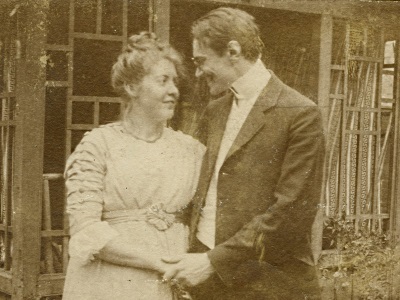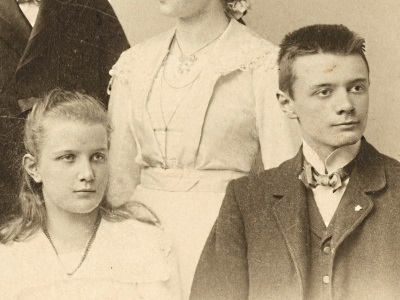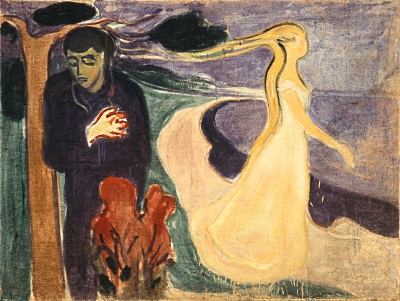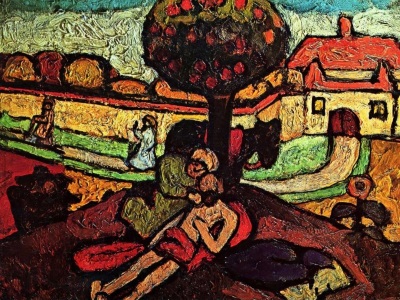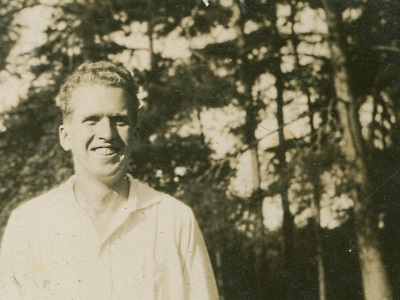I can only say that I feel more and more certain and more and more happy in my inner calling to deeds in the love of Jesus, and to the discipleship of Christ in all aspects of practical life.
- Eberhard Arnold
Summary
As a student, and later as publisher, lecturer, chaplain, and community leader, a constant in Eberhard Arnold’s life was his intense desire to study the Bible – alone and with others – and to put into practice what he read there, as well as his pastoral encouragement to other seekers of the kingdom of God.
Eberhard was sixteen when he committed himself to Christianity through the influence of his uncle, Ernst Ferdinand Klein, a pastor who preached a radical adherence to the gospels. Eberhard began a Bible study group with other teenage students, which grew to fifty members. His missionary zeal and strong sense of responsibility for his friends as fellow seekers consumed most of his time and energy. Besides leading the bible study group, he volunteered with the Salvation Army and was deeply troubled by the poverty and injustice that he encountered.
At university, Eberhard joined the Student Christian Movement, where he served as general secretary. The local chapter of the SCM grew steadily under his leadership, contributing to a broader revival sweeping the area, with lecture series and Bible study classes held in people’s homes.
After Eberhard’s marriage to Emmy von Hollander in 1909, the couple started a weekly Bible study meeting at their home. For the next few years Eberhard also traveled widely, giving sermons and lectures on themes such as “Jesus and the Riddle of the Future,” “Poverty and the Enslavement of the Masses,” “The Greatest Deed in History,” “Jesus as He Really Was,” and “Doubting God.”[1] For audiences in the hundreds, he testified that personal faith in Jesus Christ gives strength for a new life, for overcoming egotism, for love – and thereby for a change in social conditions.
During World War I Eberhard made regular pastoral visits to military hospitals in Berlin where he listened as wounded soldiers confessed their agonizing feelings of guilt and distress of conscience. These encounters proved instrumental in his change from a patriotic supporter of the German cause to an ardent pacifist.
Amid the social upheaval following the war, Eberhard became convinced that the teachings of Jesus in the Sermon on the Mount were intended to be lived out in the here and now. This belief led him and Emmy to form a Christian community settlement with likeminded believers which became known as the Bruderhof. Under his leadership the community grew to 150 people. Seeking unity with other believers, he established a partnership in 1930 with the Hutterian Brethren in America.
With the changes in his community from a fledgling movement to a growing church, Eberhard could see the dangers of hierarchy, order, and an emphasis on form. He urged members of his community to constantly think outside of the structures they were becoming accustomed to, and to remember why they were doing what they were doing – as a vehicle to support apostolic mission.
Within the community, he emphasized his leadership role as being subjugated to the role that the Holy Spirit played in guiding their movement. Revelations from the Holy Spirit, he argued, would always be new but would never contradict the Bible. In his pastoral work, he pushed those in his care to realize that the Holy Spirit speaks first into individual lives and then through individuals into the life of the church.
Eberhard shepherded the Bruderhof until his death in 1935.
1. Markus Baum, Against the Wind (Walden, NY: Plough, 2015), 51.
Selected Reading
Letter to His Sister Hannah
Eberhard Arnold
Hannah Arnold worried that through his radical stance her brother Eberhard had denied his faith in Jesus. Arnold answered his sister in a letter which was later published in Die Wegwarte, the community’s periodical. Although he had left the evangelical movement he had never denied his faith in Jesus.
Continue ReadingThe Danger of Prayer
Eberhard Arnold
What is the true meaning of prayer, and how can it have power to transform our lives? In this devotion, Eberhard Arnold describes the kind of prayer that pleases God, and he challenges us to rediscover the prayer that can change our lives and our world.
The Jesus of the Four Gospels
Eberhard Arnold
We live in an age where it seems Jesus has become almost unknown or his words distorted and disfigured, his work weakened. All the more, we must rediscover this Jesus and hold him up before all the world. We must place the Jesus of the four Gospels in the center of our faith and our life.
Continue ReadingThe Courage of Love
Eberhard Arnold
How should the church relate to politics? Eighteen months after Hitler’s rise to power, Arnold spoke about this to members of his community, whose German branch had already been raided twice by Nazi forces. The question was no longer just theory...
Continue ReadingQuick Quotes
Never burden yourself by looking far ahead. Always live one day at a time. If you can do this, you will live like children, birds, and flowers. For them each day is a lifetime. Every day unfolds new joy, new hope, even if every day may have brought you new shadows and new nightfall. Every day you may have broken down in guilt and failure. Every day may have shown you your helplessness a thousandfold. Yet each new day brings new sun, new air, and new grace.
- Eberhard Arnold
Your life will have a kind of perfection, although you will not be a saint. The perfection will consist in this: you will be very weak and you will make many mistakes; you will be awkward, for you will be poor in spirit and hunger and thirst for justice. You will not be perfect, but you will love. This is the gate and the way. Whatever you desire for yourself, wish the same for others. If you expect something from people, give the same to them. There is nothing greater than love. There is nothing more holy than love. There is nothing more true than love, nothing more real. So let us hand our lives over to love and seal the bond of love.
- Eberhard Arnold
